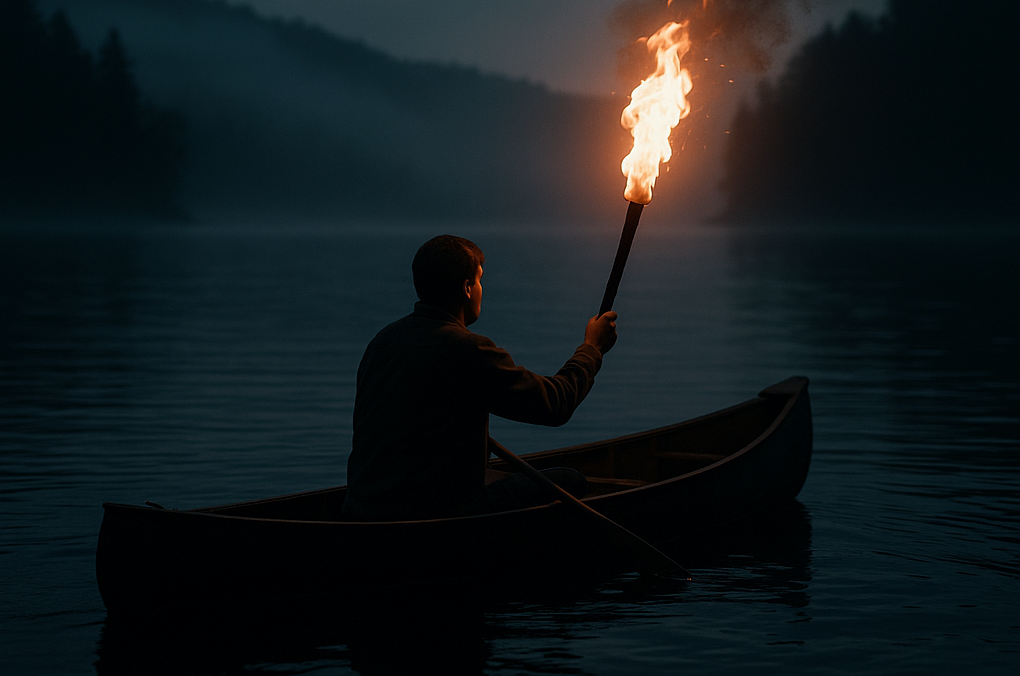
The History of Torch Lake: From Night Fishing Fires to a Northern Michigan Icon
Discover the deep-rooted history and haunted folklore of Torch Lake, Michigan — where ancient traditions, logging tales, and ghost stories shape a truly unique lakeside legacy.

Long before Torch Lake became known for its Caribbean-blue waters and sandbar gatherings, it was a place of deep cultural and ecological significance — shaped by glaciers, sustained by Native traditions, and transformed through waves of settlement and industry.
The Name Before the Maps
Torch Lake’s name tells a story all its own. Long before European settlers arrived, the Ottawa and Chippewa people lived along its shores. For them, the lake was a source of food, transportation, and spiritual grounding.
One practice in particular would leave a lasting mark: night fishing by torchlight. Using wooden torches mounted on canoes, tribal fishermen illuminated the water to draw fish closer to the surface. From a distance, flickers of flame danced across the lake, turning the shoreline into a glowing horizon. Early settlers were so taken by the sight that they referred to the body of water simply as “Torch Lake.”
A Land Shaped by Ice and Stone
Geologically, Torch Lake is a child of ice. Formed over 10,000 years ago during the last Ice Age, it was carved by retreating glaciers and filled with the purest meltwater. The result: a lake stretching 19 miles long and reaching depths of nearly 300 feet — making it Michigan’s second-deepest inland lake.
The lake's signature turquoise hue isn’t a trick of the light — it’s the result of marl, a soft, limestone-rich sediment on the lakebed. The light color of marl reflects sunlight back through the water, giving Torch Lake its otherworldly glow.
An Early Artery of Trade and Life
Long before modern maps or highways, Torch Lake was a vital piece of a larger Anishinaabe trade network. Waterways linked the lake to nearby rivers and inland routes, allowing goods, people, and stories to move through northern Michigan.
The shoreline served as seasonal ground for gathering, fishing, and ceremonial life. Even today, echoes of these practices remain — in preserved oral histories, archeological sites, and the continued presence of Native communities throughout the region.
Logging, Settlements, and the Rise of a Vacation Haven
By the mid-1800s, Michigan’s vast forests had caught the attention of logging companies. Torch Lake — with its size and access to rivers — became a crucial route for floating timber to sawmills downstream.
As logging camps turned into permanent settlements, small towns like Alden and Central Lake began to take shape. Early settlers fished the lake, worked its woods, and later farmed the land. Over time, the industry gave way to agriculture and, eventually, tourism.
By the early 20th century, Torch Lake’s natural beauty began drawing families from Detroit, Chicago, and Grand Rapids looking to escape the city heat. Cottages dotted the shoreline, many of which still stand today, passed down through generations.
Haunted Legends Around Torch Lake
Like many places with deep historical roots, Torch Lake has its share of ghost stories and local legends that linger in the fog and flicker of old cabins.
One of the most enduring tales comes from the Torch Lake Inn, a century-old building in Central Lake that once served as a summer lodge and speakeasy. Locals and guests have reported flickering lights, cold spots, and the ghostly figure of a woman seen near the top of the stairs — believed to be a former guest who passed away under mysterious circumstances in the 1920s. Today, it's a restaurant and inn, but stories of the "Lady in the Hall" continue to intrigue those drawn to the supernatural.
Just down the shoreline, there are rumors of phantom canoes gliding silently across the water at dusk — sightings often attributed to the spirits of early fishermen or perhaps even older, ancestral presences tied to the land. While some brush these off as tricks of the light or low fog rolling in, others insist there’s something watching from the woods.
Even the abandoned foundations and cellar holes in the forests east of Torch Lake have fueled whispers of long-forgotten homesteads and strange echoes that follow hikers at night. Whether you believe in ghosts or not, the stories add a certain chill to the lake’s already mystical reputation.
Cultural Continuity and Ecological Care
Torch Lake is more than a scenic backdrop — it’s a living ecosystem and a cultural touchstone. Conservation efforts in recent decades have focused on preserving water quality, preventing shoreline erosion, and honoring the lake’s cultural history.
Local organizations and community groups work to educate residents and visitors about invasive species, sustainable boating practices, and the importance of maintaining the lake's delicate balance. The same marl that gives the lake its color is also easily disrupted — a reminder that Torch Lake’s beauty is fragile and not guaranteed.
Torch Lake Today: History Beneath the Surface
While modern-day visitors often come for the sandbar or the iconic boat days, there's another layer just beneath the surface — a story of firelit canoes, glacial carving, ancestral homelands, and the long arc of stewardship that connects past to present.
Torch Lake is not just a natural wonder. It is a place where culture, geology, folklore, and memory converge — where every ripple tells a story, and every sunset reflects centuries of history.
🧭 Interested in Exploring More?
Check out our Ultimate Guide to Lakefront Vacationing in Michigan or browse our collection of nearby lakefront stays to experience the legacy of Torch Lake for yourself.
Subscribe to our newsletter!
Subscribe to get the latest updates and discounts!
.png)









